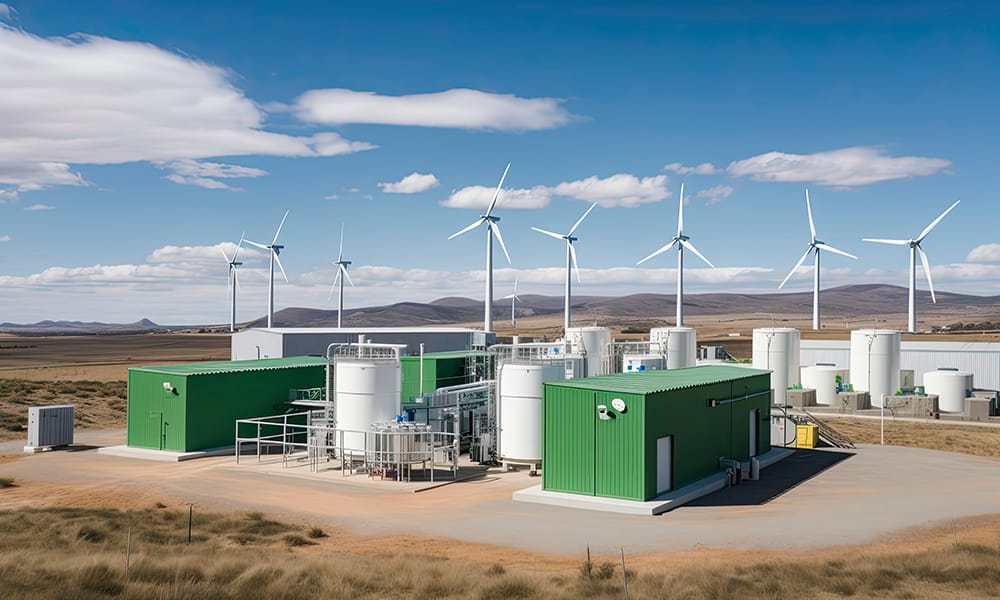- Climate.Online
- Posts
- Why Scaling Climate Tech Funding Is Key to Averting Catastrophe?
Why Scaling Climate Tech Funding Is Key to Averting Catastrophe?
Many technologies needed to cut the primary sources of greenhouse gases are already available, but they must be deployed on a large enough scale to meet the challenge.
Welcome to climate.online!
Dear Climate Change Innovators,
We're thrilled to welcome you to climate.online, your new go-to resource for cutting-edge insights in ESG and climate tech.
In a world where environmental challenges are increasingly urgent, staying informed and connected is more crucial than ever. That's why we've created climate.online – to bridge the gap between environmental consciousness and technological innovation.
What can you expect from us?
1. Curated Content: Dive into carefully selected articles, research papers, and industry reports that matter most to ESG professionals and climate tech innovators.
2. Expert Insights: Gain valuable perspectives from thought leaders, entrepreneurs, and scientists who are shaping the future of sustainable business and green technology.
3. Market Trends: Stay ahead of the curve with our analysis of emerging trends in climate tech, sustainable finance, and ESG investing.
4. Innovation Spotlights: Discover groundbreaking startups and technologies that are revolutionising the fight against climate change.
5. Policy Updates: Navigate the complex landscape of environmental regulations and global climate agreements with our concise policy briefings.
6. Networking Opportunities: Connect with like-minded professionals and potential collaborators through our exclusive events and forums.
As an early subscriber, you're not just joining a newsletter – you're becoming part of a community dedicated to driving positive environmental change through innovation and sustainable practices.
We're committed to delivering high-quality, actionable content that will empower you to make informed decisions and drive impact in your professional sphere.
Thank you for being part of this journey from the very beginning. Together, we can accelerate the transition to a sustainable, low-carbon future.
Stay tuned for our inaugural issue, coming soon to your inbox!
Warm regards,
The climate.online Team
P.S. We value your input! Feel free to reply to this email with any topics you'd like us to cover or features you'd like to see in future issues.
Why Scaling Climate Tech Funding Is Key to Averting Catastrophe?

The challenge of climate change demands a bold approach: going big is essential, as half-measures risk severe consequences. A recent venture capital report shows a slight decrease in VC funding for climate tech compared to 2023, but incentives in the Northeast continue to drive growth. Many technologies needed to cut the primary sources of greenhouse gases are already available, but they must be deployed on a large enough scale to meet the challenge. According to McKinsey & Co., scaling up technologies like carbon capture and heat pumps could reduce up to 90% of global emissions.
“We're not just focused on speed,” said Mark Patel, a senior partner at McKinsey who specializes in climate tech. “We need to aim for increasing scale and push ourselves to go bigger, faster.”
McKinsey notes that the 90% reduction in emissions can be achieved with 12 categories of climate technologies, but only 10% are currently competitive in the market. Another 45% are available but need cost reductions to compete with carbon-intensive alternatives. The remaining technologies hold promise but are still in early development.
Patel stressed that scaling up climate tech—whether batteries, solar, or sustainable fuels—is critical for maximizing their impact. He shared this message last Wednesday at a Climate Week event for investors and entrepreneurs at McKinsey’s lower Manhattan office, overlooking New York Harbor and the Statue of Liberty. Patel emphasized that if the goal of reducing CO2 by 2050 is to be met, both speed and scale must be prioritized.
Scaling isn't just about increasing size; McKinsey has studied the growth of technologies like solar and wind to outline how newer climate tech can become cost-competitive with fossil fuels. Their analysis shows that doubling deployment leads to at least a 70% reduction in costs, a predictable and reliable trend that should boost investor confidence. However, Patel acknowledged that climate tech hasn’t always followed this path—some promising technologies failed to scale beyond initial operations and never reached cost parity with fossil fuel alternatives.
Standard Chartered’s CEO Bill Winters also emphasized the importance of scaling during Climate Week. He pointed out that improvements in the voluntary carbon market, seen as crucial for unlocking climate finance, won’t have significant impact unless the market grows exponentially.
“If it’s not scaled, what’s the point?” Winters asked. “Without billions in investment, we won’t achieve the necessary impact.”
Frederick Teo, CEO of GenZero, an investment firm founded by Temasek, highlighted the need to include nature-based solutions in discussions about large-scale climate impacts. These solutions, such as conserving or restoring ecosystems like forests or mangroves, can play a vital role in sequestering CO2. “If you're considering what's necessary to make a difference at scale, nature must be part of the conversation,” Teo said.
The AI Boom: Fueling Data Centre Emissions and Climate Concerns

Artificial intelligence (AI) is now curating social media feeds and providing directions to the train station, but it's also offering a lifeline to the fossil fuel industry. Since 2020, major tech companies like Microsoft, Google, and Meta have reported significant increases in greenhouse gas emissions, largely due to AI-driven data centers filled with servers running around the clock. AI models consume vast amounts of electricity, with the World Economic Forum estimating in April that the computational power used for AI is doubling every 100 days. In the US, gas power plants that were previously set for closure are being reactivated to meet the growing demand.
AI requires immense energy, with the data processors that "train" AI systems running continuously for weeks or months, consuming 33 times more energy than traditional software. Once operational, AI tasks use far more energy than conventional methods. Sustainability researchers Gordon Noble and Fiona Berry from the University of Technology Sydney point out that a single query to an AI chatbot can use 10 times the energy of a typical Google search.
This increased energy demand contributes to higher carbon emissions and greater water consumption, putting further strain on electricity grids already affected by climate change. Data centers, essential for running AI programs, also require millions of liters of water for cooling, competing with local communities for resources, which could have deadly consequences during heatwaves or droughts.
Despite AI’s hefty resource consumption, experts argue that we still lack a full understanding of its environmental impact. In one survey, only 5% of sustainability professionals in Australia believed data center operators shared comprehensive information about their environmental footprint.
On the positive side, AI is often seen as a versatile tool for tackling environmental challenges. Its ability to process large amounts of data could help predict natural disasters, track environmental changes, and even measure iceberg shifts thousands of times faster than a human. AI might also improve the accuracy of climate models, offering hope for better simulations of Earth's changing climate.
Roux Institute Launches ClimateTech Incubator to Drive Green Innovation

On a recent Wednesday evening, a group of entrepreneurs, engineers, and government officials gathered at the Roux Institute in Portland to celebrate the launch of a new program aimed at bringing green jobs and cutting-edge technologies to Maine.
The program, called the "ClimateTech Incubator," was made possible by a $975,000 grant from the Governor’s Energy Office. It supports the founders of 12 startups as they grow their companies with backing from Northeastern University and industry leaders. The event was filled with excitement, as attendees enjoyed champagne and hors d’oeuvres while mingling with the entrepreneurs. The office space, where the startups had been working for two months, buzzed with lively conversation.
“The energy here is incredible,” said Jon Wallace, a part-time engineering lecturer at Northeastern and one of the incubator’s “entrepreneurs in residence,” who provides guidance to the startups.
Wallace is also developing his own company within the incubator, focusing on a product that helps pilots of smaller planes reduce emissions. He believes the combination of supportive founders, the Portland location, a cooperative state government, and Northeastern’s student pipeline makes the incubator uniquely promising.
“It’s rare to find a place with so many leading climate scientists, engineers, entrepreneurs, and investors,” Wallace said. “I’m confident we’ll make a significant impact on climate change.”
Outside the Roux Institute’s Fore Street office, signs of the broader climate challenge were visible. Nearby, a 3,000-passenger cruise ship idled in Portland Harbor, its exhaust rising from the stacks. Across the river, petroleum tanks could be seen from the windows. Days later, a king tide caused minor flooding at Portland Pier, highlighting a recurring issue that Northeastern plans to address at its future campus, currently under construction at the former B&M Baked Beans site.
The incubator’s startups aim to tackle these kinds of climate challenges with technology. One such company is bluesonde technologies, co-founded by ocean researcher John Williams and CEO Andrew Thompson, both former employees of Running Tide, a carbon removal company that shut down in June due to financial issues. Unlike Running Tide, bluesonde focuses on research, using buoys equipped with water quality sensors to help identify offshore wind sites and aquaculture locations.
Several other incubator startups rely on AI for various services, from bike technology that alerts riders of potential collisions to AI systems that optimize building energy efficiency by analyzing factors like occupancy and temperature.
Enodia, co-founded by Jack Watson and Rohit Bokade, uses AI to model climate-driven disasters such as floods, identifying weak points in power grids and revealing where infrastructure improvements would be most effective.
Startup founders praised the incubator for its collaborative environment, where they can exchange ideas with peers and get business advice from established companies like Elipsa, which specializes in building energy efficiency. The office also features a lab space, where bluesonde has been developing its buoys.
Dan Burgess, director of the Governor’s Energy Office, highlighted the green technologies already being developed in the state and the incubator’s potential to drive even more innovation. He mentioned the planned energy storage project in Lincoln, supported by a $147 million grant from the U.S. Department of Energy, and ongoing offshore wind development as examples of Maine’s progress.
Daily News for Curious Minds
Be the smartest person in the room by reading 1440! Dive into 1440, where 4 million Americans find their daily, fact-based news fix. We navigate through 100+ sources to deliver a comprehensive roundup from every corner of the internet – politics, global events, business, and culture, all in a quick, 5-minute newsletter. It's completely free and devoid of bias or political influence, ensuring you get the facts straight. Subscribe to 1440 today.
We hope you find climate.online to be an invaluable resource as you navigate the rapidly evolving world of ESG and climate tech. Your journey towards making a lasting impact starts here, and we’re excited to support you every step of the way.
As we move forward, remember that your insights and feedback are crucial in shaping the future of this platform. Together, we can push the boundaries of what’s possible, fostering innovation that not only addresses today’s environmental challenges but also creates a more sustainable tomorrow.
Thank you for your commitment to driving positive change. We’re thrilled to have you on board and can’t wait to see the difference we can make together.
Best regards,
The climate.online Team